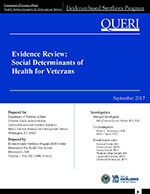
Principal Investigator: Wei (Denise) Duan-Porter, MD, PhD
Co-Investigators: Brian C. Martinson, PhD; Brent Taylor, PhD
Download PDF: Complete Report, Executive Summary, Report, Appendices
Social determinants of health usually refer to factors that are socially constructed and/or impact health through socio-cultural mechanisms. Social determinants are responsible for much variation in health outcomes, especially when considered together with their linked environmental exposures and health behaviors. Indeed, seminal work on social determinants of health demonstrated that they are potent factors in predicting health disparities, with the disadvantaged suffering the worst outcomes. Understanding the role of social determinants in the health of Veterans, and identifying clinical and research opportunities to impact the pathways between social determinants and health, are critical for the VHA's mission to serve and improve health outcomes for all Veterans.
Taken as a whole, social determinants substantially influence health outcomes and contribute to health disparities. The VHA Office of Patient Care Services—Population Health Services and Office of Rural Health (hereafter, VHA partners) requested an evidence review to examine social determinants of Veterans' health, particularly as to those social determinants which may be more important for Veterans' health outcomes (or for certain Veteran groups), as compared with non-Veterans. The goal for this evidence review was to guide VHA planning for health care services that may be influenced by, or should be targeted to, social determinants contributing to poorer health and greater care needs among Veterans. In collaboration with our VHA partners, we developed the scope and conceptual framework for the evidence review, with the focus being social determinants that may be differentially important for Veterans compared with non-Veterans, or between Veterans enrolled in or utilizing certain VHA services, compared with those Veterans who did not. We engaged our VHA partners in a prioritization process after developing an initial evidence map, and selected those social determinants which would undergo more detailed review and reporting of published results (ie, rurality, trauma history, sexual orientation and gender identity).
Key Question 1: How do Veterans compare to non-Veterans in prevalence and characteristics of social determinants of health?
Key Question 2: Does variation in social determinants of health account for differences in health services access, health-related behaviors, and health outcomes between Veterans and non-Veterans?
Key Question 3: How do engaged (ie, enrolled in or utilizing categories of VHA services or benefits) Veterans compare to non-engaged (ie, not enrolled in or utilizing VHA services or benefits) Veterans in prevalence and characteristics of social determinants of health?
Key Question 4: Does variation in social determinants of health account for differences in health services access, health-related behaviors, and health outcomes between engaged Veterans and non-engaged Veterans?
Evidence Review: Social Determinants of Health for Veterans (Management eBrief)
Duan-Porter W, Martinson BC, Greer N, Taylor BC, Ullman K, McKenzie L, Rosebush C, MacDonald R, Falde S, and Wilt TJ. Evidence Review - Social Determinants of Health for Veterans. Journal of General Internal Medicine. 2018;33:1785-1795. https://doi.org/10.1007/s11606-018-4566-8